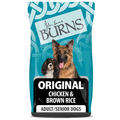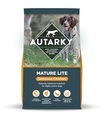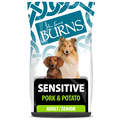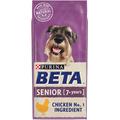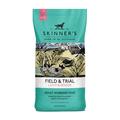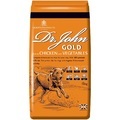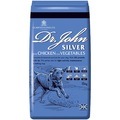Caring for your senior dog...
Just like us, dogs age and undergo change, however this occurs in dogs much earlier. For dog lovers alike this is a difficult reality, yet the good news is it can be simply managed by careful observation and by better understanding the lifestyle, nutrition, exercise and veterinary needs of your ageing companion.
By recognising how your dog’s needs have changed, you ensure his capacity to lead a fulfilled and healthy life is never compromised. Maturity is just another stage of development and although ageing usually brings some degree of detriment, there are ways to manage its effect for the comfort and longevity of your dog. Learning about the ‘golden years’ early will help you to identify changes when they occur, so you can distinguish what is normal from what is a cause for concern.
 When identifying changes, it is useful to remember that most age-related problems suffered by humans are also suffered by dogs, with common ailments such as failing eyesight, hearing loss and loss of appetite, being prevalent amongst senior dogs. Other changes to look out for include changed, disrupted or extended sleep patterns, reduced interest in exercise or play, limited movement or movement that appears awkward, changes in feeding, and disorientation.
When identifying changes, it is useful to remember that most age-related problems suffered by humans are also suffered by dogs, with common ailments such as failing eyesight, hearing loss and loss of appetite, being prevalent amongst senior dogs. Other changes to look out for include changed, disrupted or extended sleep patterns, reduced interest in exercise or play, limited movement or movement that appears awkward, changes in feeding, and disorientation.
As a dog ages, simple matters of house training become more problematic and it is not uncommon for a senior dog to have less control over when and where he goes to the toilet. Being prepared for this will make the ageing process much more manageable for both you and your dog. Similarly, as your dog gets older he may struggle navigating the home, being unable to reach his favourite seat or access areas he once found with great ease, so it is important to bear this in mind, particularly if your dog is unsupervised for periods of the day.
Disposable pads for toilet training and avoiding accidents in the home.
Ramps and steps for accessing the boot of the car, the sofa and anywhere else your ageing dog wants to go.
Whilst loss of sight and mobility problems are unwelcome changes, they are likely to appear in all mature dogs to some extent. Cataracts and osteoarthritis are severe cases that will require veterinary treatment. More serious age-related ailments include organ disease, which may necessitate medical management or a lifestyle change. Bronchitis or lung disease, for instance, could be mistaken for a regular cough, although it is much more easily contracted in senior dogs.
Additionally, it is important to observe good dental practices and care, as gum disease will discourage your dog from eating, something which can lead to unhealthy weight loss. On the other hand, over-feeding your dog or maintaining the same diet it enjoyed in its adult years can lead to weight gain, as the metabolism slows as the body ages. A specially tailored senior diet is beneficial for the weight and internal health of your dog, with older dogs requiring a different balance of nutrients. A bit like us requiring more supplements as we age, and burning fewer carbohydrates.
Oral hygiene gel that can be used as a toothpaste or added to food.
Dental chews for a tasty, beneficial snack.
Dental toys for enjoyment and teeth strengthening.
Toothbrushes for maintaining oral health and hygiene.
Senior dog foods for the internal nourishment of ageing canines.
Exercise is another factor to consider in caring for your senior dog. Intense exercise will tire your dog quickly and may place pressure on inflamed or already tired joints. A variety of supplements and pain-relief medication can be obtained to manage these symptoms, although it is just as important to adapt your lifestyle and routines around the needs of your canine. Dogs with hearing loss may benefit from the use of hand signals rather than verbal instructions, a change which can be developed gradually.
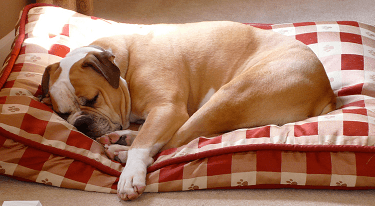 Providing a warm space for sleep and relaxation will further enhance life quality, as senior dogs are less able to regulate and maintain their body temperature. This makes them more susceptible to heat stroke on warm days and pneumonia in the colder seasons. Also, a comfy sleeping space is great for the tired or arthritic dog, just as it would be for us after a long day at work!
Providing a warm space for sleep and relaxation will further enhance life quality, as senior dogs are less able to regulate and maintain their body temperature. This makes them more susceptible to heat stroke on warm days and pneumonia in the colder seasons. Also, a comfy sleeping space is great for the tired or arthritic dog, just as it would be for us after a long day at work!
Dog bedding for all dogs alike.
Ageing is a completely natural process and it needn’t be stressful. By understanding how your dog’s needs have changed, just as they did moving from puppyhood to adulthood, and modifying aspects of diet, exercise and care, you can reinforce and maximise health, whilst maintaining a good standard of living whatever your dog’s age, requirements, and personality.
Do you have any further suggestions on caring for a senior dog? Please share them with us! Feel free to contact me directly with any questions: [email protected]
Written by: Hannah

